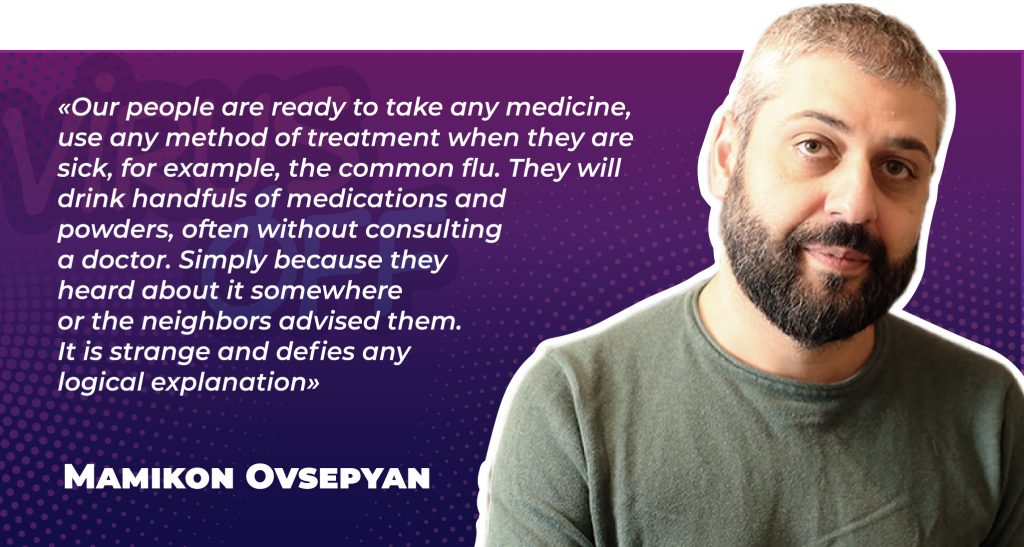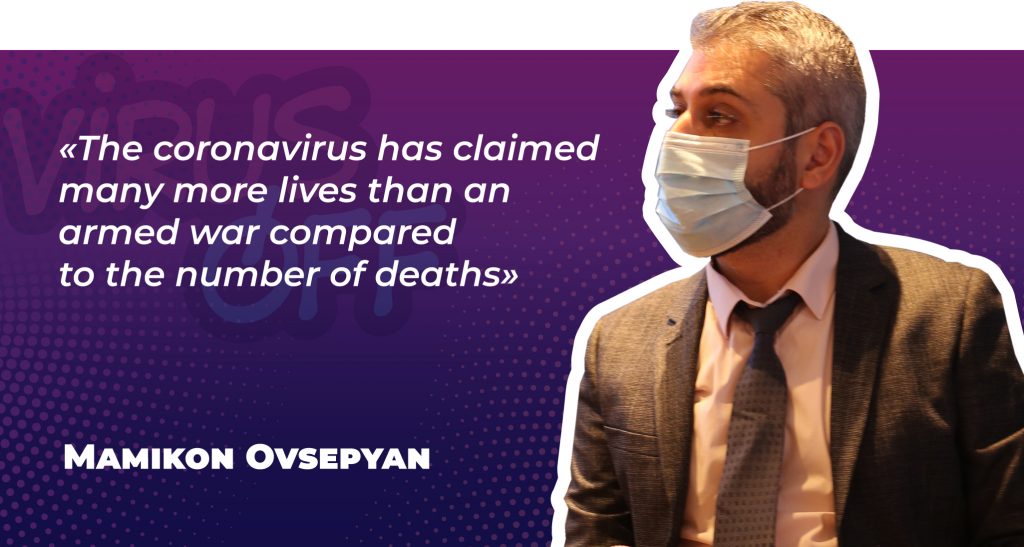The founder and communications director of PINK ARMENIA, Mamikon Ovsepyan, believes neither in chipping, 5G rays, nor a universal conspiracy. The LGBT activist is confident that vaccinations and common sense will stop the pandemic worldwide. Read more in the latest interview with virusoff.info.
Mamikon, there are several positions listed on your Facebook page. Which one is the most important to you?
My most crucial place of work is the human rights organization PINK ARMENIA. We are the leading organization in the country that provides assistance and support to the LGBT community. The rest of my positions are also important, but as a rule, I am on a volunteer basis in other organizations.
Why did you choose this area for your job?
The main reason is that I personally am part of the LGBT community. Many years ago, I decided for myself that I wanted to engage in discussion of taboo topics, work to achieve equality in society and, of course, protect others, like me, people who have similar problems. For this, my colleagues and I founded PINK ARMENIA 10 years ago. I have been a part of the organization from the very first day of its foundation and have been involved in various jobs. Now I am focusing on communication. Unfortunately, the rights of LGBT people in Armenia are still being hurt, and quite strongly, so there is something to work on.
Who is sponsoring the organization?
We started as volunteers. Our first events solely derived from our initiative and enthusiasm. Our first official partner was the Norwegian Embassy. A little later, the Norwegian Ministry of Foreign Affairs began to provide us with grants. Well, then we started to cooperate with a variety of international donors.
What is the official position of the authorities and the church regarding the LGBT community in Armenia?
The church has always experienced only hatred for us. The previous government was also not very tolerant, and we even came up with such a definition – “government-sponsored homophobia” when officials and officials promoted homophobia wherever possible. Now the situation has changed a little, and the current government is more advanced in this area, but, unfortunately, it still does nothing to protect the rights of the LGBT community.
Mamikon, since the main topic of our interviews is vaccination, tell us at what level it is in your team. Are you all vaccinated?
Yes, most of my colleagues are vaccinated, and so am I. It is effortless to get a vaccine in Armenia. We have a wide selection of vaccines – there are Chinese, Russian, and European ones. But our people think in myths and stereotypes, which is why we have a deficient level of vaccination – only 17% of the total population are vaccinated. However, you can get a vaccine on the streets like in special mobile laboratories. All you need is a passport. You can do the same at the clinic – just make an appointment for a specific day – and you’re done. That is why we have a significantly developed “vaccine tourism.” For example, Iranians regularly come to us for a free vaccine. Most Armenians do not want to be vaccinated.
The number of fully vaccinated citizens of Armenia, in percentage (constantly updated):
Have you had such mistrust of vaccines before, or is it just against the backdrop of the coronavirus pandemic?
We have fascinating people in general. On the one hand, our people are ready to take any medicine, use any method of treatment when they are sick, for example, the common flu. They will drink handfuls of medications and powders, often without consulting a doctor. Simply because they heard about it somewhere or the neighbors advised them. At the same time, when it comes to vaccination, they have a lot of fears – that this is dangerous chemistry, that these are some foreign components that they are being chipped. It is strange and defies any logical explanation. When a vaccine against human papillomavirus became available in our country, absolute hysteria began. People were convinced that vaccinated women could no longer have children, and men would lose their reproductive function. Such is life.

Does the government somehow motivate people to get vaccinated? In Moldova, for example, vouchers to restaurants are handed out, and vaccination marathons are regularly organized. Thus, we barely raised the vaccination rate to 30%.
No, they don’t do it here, although it’s a good idea (smiles). The government, unfortunately, failed this war from the very beginning when it tried to stop the spread of the virus. Their tactics were wrong. And the most important thing: you need to understand that a year ago, a real war began in our country, and against the background of an armed conflict, the coronavirus was simply lost. Nobody thought about wearing masks when our country was in danger.
In your opinion, an armed war is worse than the war that people are waging with the coronavirus? After all, many are now drawing analogies without realizing what an actual military conflict implies.
The coronavirus has claimed many more lives than an armed war compared to the number of deaths. But emotionally, such a war is much more violent. Every day we live in fear because we all have relatives, friends, family members who live on the border or serve in the army. And one day, you wake up and learn from the news that half of the village where your relatives live has been captured. And you will never know what happened there. It is one of the reasons why we simply forgot about the coronavirus when an armed war broke out a year ago. We just had no time for it, and we did everything to survive. No one thought about masks, and we wanted to save our country.
How have the last year’s events (I mean both the pandemic and the war) influenced your organization’s work?
It looks like a protracted existential crisis. And, of course, when there were military battles and a state of emergency was introduced in the country, we did not understand how we could do something else because we were losing our country; what could be more important? Therefore, we try to analyze the situation in which we find ourselves and try to understand how we can continue to work further, what we can refuse, and what we need to pay attention to on the contrary. The community members are also very tired, exhausted. That is why for the last year, we have been paying particular attention to psychological counseling and support. We do our best so that people can survive this period and not break down.
Are you motivating your customers to get vaccinated against the coronavirus?
Yes, of course. When we talk about safety, first, we mean health. And, of course, in addition to HIV and sexually transmitted infections, we started talking about COVID-19. Now, this is important. Our primary beneficiaries are young people aged 20-25. It is difficult to speak with them because they think the coronavirus will not affect them. After all, they are young and full of energy. But we are trying to convince them.

How did your loved ones survive the pandemic?
I wasn’t visiting my parents for a long time, and it was at the very beginning of the epidemic when a lockdown was introduced in Armenia. And when I finally came to them for five days, I spent all those five days in a mask at home. And then we decided nevertheless to go out into the city for shopping and went to a supermarket, and there everyone walked around without masks. And so my parents just come in and buy a full cart of groceries. And for some reason, I sat all these five days in a mask at home (laughs). It was bizarre. I live alone to protect myself, but it is more difficult with my parents. But now they are vaccinated, I am calm about them.
What would you say to those who are still afraid to get vaccinated? Why do you need to do this?
First, you don’t have to believe in all this conspiracy nonsense, and it’s not true. It is necessary to read scientific articles, the main ones on research, or at least interviews with doctors who know precisely the situation from the inside. And second, we must take care of our health. Because if we do not do this ourselves, no one will do it for us. And when we take care of ourselves, we must take care of those we love and who are dear to us. It is the only way we can defeat the pandemic.
Text: Elena Derzhanskaya
Photo: personal archive of the hero
A series of materials created supported by UNAIDS




